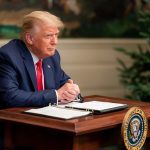President Trump has taken bold action by suspending all U.S. aid to South Africa, a move that should have everyone paying attention, especially considering the new land expropriation law that many fear could lead to white landowners facing a Zimbabwe-style nightmare. Announcing this surprising decision on his social media platform, Truth Social, on Sunday evening, Trump made it clear that America will no longer support a nation that appears intent on repeating the same mistakes that drove Zimbabwe to economic ruin.
For those who haven’t been keeping track, South Africa was set to receive approximately $273 million in 2023, although some reports inflate that number to around $440 million. This money goes a long way, covering everything from the President’s Emergency Plan for AIDS Relief to various trade deals beneficial for both nations. However, many may wonder why taxpayers in the U.S. should be sending hard-earned dollars to a government that seems bent on pursuing radical policies that don’t just threaten property rights, but also echo the worst excesses of a failed regime elsewhere on the continent.
President Donald Trump just posted this to TruthSocial threatening all future funding to South Africa in relation to “confiscating land” and “treating certain classes of people very badly”.#sabcnews pic.twitter.com/bQDWwYxOfc
— Sherwin Bryce-Pease (@sherwiebp) February 3, 2025
The roots of the land expropriation issue have been simmering for decades in South Africa. Despite the ugly legacy of colonialism and apartheid resulting in a disproportionate amount of land being owned by a white minority, it’s crucial to note that the country had previously avoided following Zimbabwe’s disastrous lead. While South Africa permits land seizure under a process akin to eminent domain, the existing preference has been to maintain a fair market process. Now, however, radical elements are clamoring for outright confiscation of white-owned farms, and while many black South Africans have no interest in farming, the fervor on this issue remains potent.
The new Expropriation Act has alarmed many, as it allows the government to snatch private land without any compensation for the owners—a scenario that makes everyone shudder at the implications for property rights and economic stability. Although opposition parties within a now frail national unity government control the agriculture ministry, which could stall the implementation of this act, the potential for political fallout looms large. If radical politics continue to dictate terms, South Africa may find itself not just economically precarious but also politically fractured.
On top of everything, South Africa’s shift towards cozy relations with nations such as China and Russia, coupled with its support for Palestinian terror against Israel, places the country at odds with American interests. Trump’s staunch stance against these developments serves as a reminder that U.S. taxpayer dollars should not flow to countries that undermine American values and alliances. It appears that the world is taking note, as South Africa risks alienating one of its key allies while flirting with authoritarianism fueled by radical agendas.




